The 5 Best Books for Millennials About Money in 2025
October 25, 2024
The best books for Millennials about money focus on emotions, not tactics
Someone asked me the other day, “What do you think is the best way to start investing?”
My initial reaction was “the right information.” Investing, and personal finance in general, doesn’t need to be complicated.
That’s not the same as easy, though.
The financial tradeoffs we face make our financial decisions challenging. But the right information can eliminate unnecessary stress and self-doubt.
My Criteria for Selecting the Best Books for Millennials About Money
On an almost daily basis, we’re inundated with conflicting financial opinions. We hear from online articles, social media, and the people around us.
If you’re a Millennial who isn’t yet ready for financial planning, a thoughtful personal finance book is one of my favorite alternative resources. The thought and research required to write a book increases the likelihood that we benefit from the contents.
What will you find in common among my “best books for Millennials” selections? I emphasized the following three criteria:
- Clarity: each book must explain new or complex financial topics clearly
- Patience: each book should prioritize sustainable habits over “get rich quick” schemes
- Empathy: each book must offer ideas that embrace human emotions & reflect modern challenges
With that in mind, here are what I consider the five best books for Millennials about money in 2025:
Best Book #1: The Psychology of Money
About the author:
Morgan Housel is a partner at the Collaborative Fund. He previously was a columnist at The Wall Street Journal and The Motley Fool.
How the author describes the book:
“In 2018, I wrote a report outlining 20 of the most important flaws, biases, and causes of bad behavior I’ve seen affect people when dealing with money…. This book is a deeper dive into the topic…. What you’re holding is 20 chapters, each describing what I consider to be the most important and often counterintuitive features of the psychology of money.”
Why I consider this one of the best books for Millennials about money:
When we decide we want to improve our finances, we often devote our time and energy to tactics. We focus almost exclusively on numbers. We fixate on rules of thumb and arbitrary benchmarks.
But financial success depends more on financial psychology. Our emotions and biases often drive our actions. Most people, though, don’t think about the role that money played in their lives when they were growing up. Most people don’t analyze the root of their financial fears.
The Psychology of Money is the perfect book to bring this aspect of money to the forefront of our decision making.
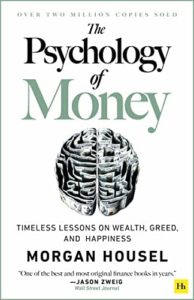
A preview, about financial compounding:
“The danger here is that when compounding isn’t intuitive, we often ignore its potential and focus on solving problems through other means. Not because we’re overthinking, but because we rarely stop to consider compounding potential.
None of the 2,000 books picking apart [Warren] Buffet’s success are titled This Guy Has Been Investing Consistently for Three-Quarters of a Century. But we know that’s the key to the majority of his success. It’s just hard to wrap your head around that math because it’s not intuitive.
There are books on economic cycles, trading strategies, and sector bets. But the most powerful and important book should be called Shut Up and Wait. It’s just one page with a long-term chart of economic growth.
The practical takeaway is that the counterintuitiveness of compounding may be responsible for the majority of disappointing trades, bad strategies, and successful investing attempts.
You can’t blame people for devoting all their effort – effort in what they learn and what they do – to trying to earn the highest investment returns. It intuitively seems like the best way to get rich.
But good investing isn’t necessarily about earning the highest returns, because the highest returns tend to be one-off hits that can’t be repeated. It’s about earning pretty good returns that you can stick with and which can be repeated for the longest period of time. That’s when compounding runs wild.”
You can purchase The Psychology of Money here!
Best Book #2: Just Keep Buying
About the author:
Nick Maggiulli is the chief operating officer and data scientist at Ritholtz Wealth Management. He is also the author of OfDollarsAndData.com, a blog focused on the intersection of data and personal finance.
How the author describes the book:
“I will answer some of the most asked questions in personal finance and investing… Most importantly, the answers to these questions will be based on data and evidence, rather than belief and conjecture. This means that some of my conclusions will go against mainstream financial advice…. My goal isn’t to be controversial, but to use data to search for the truth, wherever it may be. Ultimately, Just Keep Buying is a book illustrating the proven ways to save money and build your wealth.”
Why I consider this one of the best books for Millennials about money:
Investing feels daunting to many Millennials due to the numerous companies, apps, accounts, and funds available to us. And just when you’ve decided on a basic approach, the stock market declines, testing your discipline and patience.
But Just Keep Buying uses ample market data to show how you can avoid much of this stress. The data makes clear that building your wealth over time doesn’t hinge on large gains. Rather, the book proves that if you can stick with a simple plan over the long term, you’ll likely accomplish your investing goals.
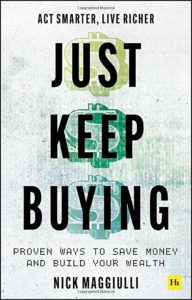
A preview, about owning income-producing assets:
“Guess who’s the richest NFL player in history?… It’s a guy by the name of Jerry Richardson. You’ve probably never heard of Richardson. Neither had I. But he is the only billionaire to ever play in the NFL.
How did Richardson make his money? Not by playing football.
Richardson was a good enough player. He was on the team that won the 1959 NFL Championship. But he built most of his wealth by opening up Hardee’s fast food franchises across the U.S. Eventually he acquired enough capital to start the Carolina Panthers NFL franchise in 1993.
It was Richardson’s ownership of business ventures that made him fabulously wealthy, not his labor income.
I want you to think about growing your income in the same way. Yes, selling your time, skills, or products is great and all, but it shouldn’t be the end goal of your wealth-building journey.
The end goal should be ownership – using your additional income to acquire more income-producing assets.
Whether that means investing in your own business or in someone else’s, you need to convert your human capital into financial capital to build long-term wealth.”
You can purchase Just Keep Buying here!
Best Book #3: I Will Teach You To Be Rich
About the author:
Ramit Sethi writes about money, business, and psychology for a million readers every month at IWillTeachYouToBeRich.com.
How the author describes the book:
“I believe in small steps. I want to reduce the number of choices that paralyze us. It’s more important to get started than to spend an exhaustive amount of time researching the best fund in the universe. I Will Teach You To Be Rich is about taking the first step – understanding the barriers that keep us from managing our money and then tearing them down and putting our money in the right places so we can achieve our goals.
Frankly, your goal probably isn’t to become a financial expert. It’s to live your life and let money serve you. So instead of saying, “How much money do I need to make?” you’ll say, “What do I want to do with my life – and how can I use money to do it?” And instead of being driven by fear, you’ll be guided by what history has shown us about investing and growth.”
Why I consider this one of the best books for Millennials about money:
Many of us don’t want to devote any more time or energy to financial decisions than we need to. To make the process easier, we often rely on generalized rules of thumb. Or we – perhaps reluctantly – follow the wisdom that our grandparents, parents, and colleagues offer. Unfortunately, we do this to our detriment when the advice doesn’t fit us well.
I Will Teach You To Be Rich is the best book for empowering yourself to reject outdated money tips. The book’s irreverent candor feels refreshing as you realize that you have other choices available to you.
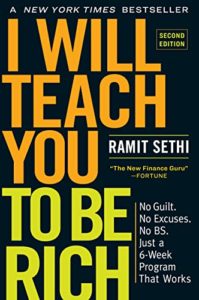
A preview, about buying a house:
“Will you be able to stay in the house for at least 10 years? Buying a house means you’re staying put for a long time. Some people say five years, but the longer you stay in your house, the more you save. There are a few reasons for this: when you go through a traditional real estate agent, there are large transaction fees – usually six percent of the selling price. Divide that by just a few years, and it hits you a lot harder than if you had held the house for 10 or 20 years. There are also the costs associated with moving. And depending on how you structure your sale, you may pay a significant amount in taxes. The bottom line here: buy only if you’re planning to live in the same place for 10 years or more.
I have to emphasize that buying a house is not just a natural step that everyone has to take at some point. Too many people assume this and then get in over their heads. Buying a house changes your lifestyle forever. No matter what, you have to make your monthly payment every month – or you’ll lose your house and watch your credit tank. This affects the kinds of jobs you can take and your level of risk tolerance. It means you’ll need to save for a six-month emergency plan in case you lose your job and can’t pay your mortgage. In short, you really need to be sure you’re ready for the responsibility of being a homeowner.”
You can purchase I Will Teach You To Be Rich here!
Best Book #4: The Price You Pay For College
About the author:
Ron Lieber is the author of The Opposite of Spoiled and is the Your Money columnist for the New York Times.
How the author describes the book:
“This book is… for you. We lack the clarity we deserve and a sense of control over the college process, especially now that nearly every higher education institution is reeling. Moreover, I want us all to feel much more competent about this decision, given that it sure seems as though someone designed this entire multi-year gauntlet that we run to sow maximum confusion. I don’t doubt the sincerity or the good intentions of the thoughtful people I’ve met who are the gatekeepers and overseers at these schools. But something isn’t quite right in all of this, and with this book I hope to help us all begin to make it right.”
Why I consider this one of the best books for Millennials about money:
Many Millennials have spent much of their adult lives paying off their student loans. Now, some members of our generation have kids of our own. As we begin to save for a college education, we’re keenly aware of college costs. And we understand all too well the ramifications of this particular life decision.
Maybe higher education, including college tuition, will look different in 18 years. For now, though, we need to do our best to prepare our families for the current system. The Price You Pay For College is unsurpassed in its ability to unpack the many variables associated with choosing a college.
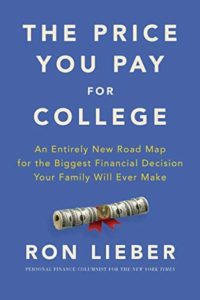
A preview, about college merit aid:
“Merit aid exists because colleges worry that if they don’t give out even more discounts aside from the need-based ones, not enough students will choose to pay for their school. To solve for that, many give merit aid money to applicants they most want. And at some schools, every student gets merit aid even if they are wealthy ‘B’ students, which undercuts the notion of ‘merit’ as most of us think about it.
As for the “aid” part, you probably came to this process thinking that financial aid of any sort would go to people who are somehow needy. But merit aid often goes to people who are wealthy, even in the 1 percent. Nevertheless, the schools that offer it believe that families ‘need’ a discount to believe that a particular school offers a good enough value to commit.
You may hear schools and other applicants using different words and phrases to describe merit aid, and you may not know what they are actually talking about when they do. They may not know what they are talking about, either. At some colleges, people with financial need may get ‘grants’ while the schools woo more affluent applicants with ‘academic scholarships.’ The financial aid office may decide how much money your family needs, while the admissions office decides (with the help of those consultants) how much merit aid you deserve (or what they think it will take to get you to commit).
Moreover, you may find out about your own financial fate through what’s known as a ‘financial aid award letter,’ which uses all of your merit aid to satisfy some of your demonstrated financial need. This too is confusing, and it’s also purposeful, as we’ll soon learn. As ever, it pays to ask lots of questions.”
You can purchase The Price You Pay For College here!
Best Book #5: The Index Card
About the authors:
Helaine Olen is an opinion writer for the Washington Post. She previously was a columnist for Slate and wrote the “Money Makeover” feature for The Los Angeles Times. Harold Pollack is the Helen Ross Professor at the Crown Family School of Social Work, Policy, and Practice at the University of Chicago.
How the author describes the book:
“So a question: If [Harold’s personal finance] rules are so simple, why do you need more than an index card – heck, a book – to explain them? Most of us don’t want to follow rules unless we know why they are rules. This book explains how the rules work and why we chose them. They may be simple, but they aren’t always self-explanatory…. Just telling you financial rules to follow is not the same thing as showing you how to master them so that you can follow them with confidence.”
Why I consider this one of the best books for Millennials about money:
Our money plays such a central role in our lives that we naturally strive for the most optimal decisions. But due to our different priorities and values, “perfect” financial decisions don’t actually exist. As a result, if we make mostly prudent financial moves, we’re doing about as much as we can to ensure our own success.
The Index Card is intentionally straightforward and accessible for all readers. Some Millennials may reach, or already be at, a stage in which they’re ready for less common strategies. But everyone would benefit from mastering the essential personal finance ideas in this book.
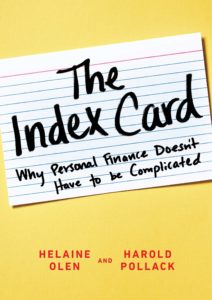
A preview, about investment strategies:
“Most of us don’t need a complicated, elaborately planned investment scheme that requires more choices and frequent changes. As the cliche goes, don’t let the perfect be the enemy of the good. There is no perfect investment scheme anyway. Don’t let anyone tell you otherwise.
Are we guaranteeing success or protecting you from every bad scenario? No. That’s not possible. Instead, we’re offering you a simple, easy-to-follow action plan.
…The sooner you think you need the money, the less risk you should assume. If you have a pot of money put aside to buy a house, and you are planning to purchase it this year, you should probably move it into a short-term bond fund. The same is true for your emergency money. Never make the assumption that a stock market that is going up will continue to go up until the day you need the money….
Conversely, if you are 25 years old and this is your retirement savings, an aggressive growth strategy is likely better. The healthier and wealthier you are, the more risks you can reasonably take. Why? You have time to recover from setbacks. Moreover, if you are in your twenties or thirties, you are probably not in your prime earning years, meaning your household income is likely to increase, allowing you to compensate for any investing losses.”
You can purchase The Index Card here!
What You Will Learn From the Best Books for Millennials About Money
A truly valuable book about money teaches wisdom more than tactics.
You can easily find articles or blog posts that cover detailed personal finance questions such as, “How can I reduce my taxes this year?” By comparison, the best books teach you how to think about money as a tool to improve your life. And such books do so in a way that helps you to re-evaluate money’s role in your life, including as a source of stress or anxiety.
Ultimately, the best books about money empower you to make life-changing decisions.
Your Questions About Personal Finance Books for Millennials
What personal finance books have you found helpful?
I’d love for you to send me an e-mail at kevin@illumintfc.com with ideas for the next edition of the “Best Books for Millennials About Money” list. You also can subscribe to my finance podcast for Millennials to learn more how you can invest in your family’s future.
Recommended Reading
If you found value in this article, you may also enjoy reading:
- Millennials, Here’s What To Do With an Inheritance in 2024
- The Cost of Living in Washington, DC, for Millennials in 2024
About Kevin Mahoney, CFP®
Hi, I’m Kevin. I’m the founder of Illumint and a financial advisor in Washington, DC. I specialize in financial planning for Millennials like you. As a Millennial father and Certified Financial Planner™, I empower our peers to invest with confidence and flexibility. If you’re new to Illumint, I’m glad you’re here – you now have access to free personal finance tips written specifically for Millennial parents. I encourage you to read, watch, or listen to the ideas I share about exchanging your money for memories with your kids. And then when you’re ready, please send me your thoughts & questions!
Kevin Mahoney, CFP®
About Me
Once each month, 904 Millennials like you receive my free personal finance tips & links
Free Money Tips, delivered monthly.
Address: 641 S Street NW, Washington, DC, 20001 (The Wonder Bread Factory)
© 2025
Illumint is a Registered Investment Advisor in Washington, DC
(Form ADV)